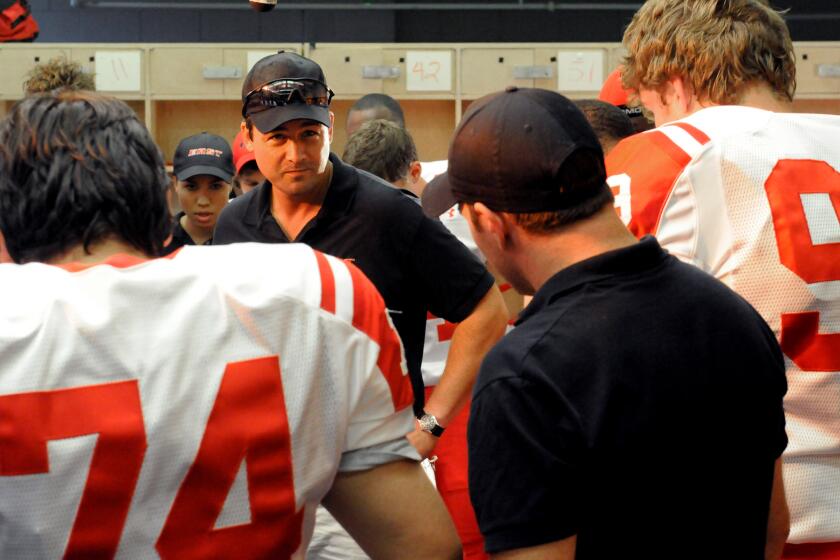TV ‘Noir’ Features Rare, Seminal Programs
The American Cinematheque at Raleigh Studios, 5300 Melrose Ave., presents “Television Noir: Gangsters, Gumshoes and Shady Ladies of the Small Screen” Saturday through Aug. 31.
The series is as catch-all and inviting as it sounds, with plenty of opportunities to see some rare, fascinating programs featuring a number of familiar names who went on to make their mark on the big screen.
The series gets under way Saturday with “Cassavetes’ Lost Noirs,” two screenings, at 7 and 9:30 p.m., which together will present the four episodes of the highly regarded but short-lived “Johnny Staccato” series (1959-60) directed by John Cassavetes, who starred as a Manhattan jazz pianist/gun-for-hire.
They’re much closer in look and style to Cassavetes’ 1962 “Too Late Blues,” a studio-made B-drama with a jazz background, than to the gritty, highly personal, semi-improvised “Shadows” (1960), which he financed with his “Staccato” earnings and which launched his career as a major and distinctive independent filmmaker. What’s intriguing about the two “Staccatos” that were available for preview--both involve men dangerously obsessed by women, one played by Elisha Cook Jr., the other by Walter Burke--is that as well-directed as they are, you could actually imagine them working equally well as radio dramas.
That could never be said of the one-hour “Once Upon a Savage Night” (Aug. 30 at 9 p.m.), which Robert Altman directed in 1964 for “Kraft Suspense Theater.” An early serial killer thriller, it reminds us just how intensely cinematic dramas made for the small screen could be. Shooting in a highly atmospheric downtown Chicago and its outlying freeways at night, “Savage Night” is a pursuit picture, dazzling in its sheer visual impact.
By way of jolting contrast is a gory but awesomely inept segment from “Armchair Detective” (Aug. 31 at 7 p.m.). Another solid offering is “Doomsday” (Aug. 23 at 9:30 p.m.), a 1957 segment for the one-hour “Suspicion”--starring Dan Duryea and directed by Bernard Kowalski and written by Sy Bartlett--that plays like a genuine film noir. Duryea plays a cattle rancher/master bank robber of exceptional civility and loyalty who meets a cruel twist of fate.
Among many other treats: Phil Karlson’s 1962 “The Scarface” (Aug. 24 at 9:30 p.m.), a two-part show that was a pilot for “The Untouchables.” Information: (213) 466-FILM.
If Alfred Hitchcock’s 1926 “The Lodger” (Wednesday at 8 p.m. at the Silent Movie) lacks the intense suspense and dynamic fluidity of the Hitchcock classics, it is nonetheless a remarkably assured third film and the first he considered truly his own. It opens with a stunning sequence that establishes that London is in a panic over a Jack the Ripper-like killer. Ivor Novello, a matinee idol of the day, stars as a young man who may be the serial killer known as the Avenger. Information: (213) 653-2389.
It’s hard to figure out why the Nuart is bringing back “Barbarella”--and for a full week yet, starting Thursday. Time has been lots kinder to Jane Fonda than this precious, inane sci-fi adventure designed by her then-husband, director Roger Vadim, to display as much of his wife’s gorgeous figure as the 1968 laws would allow. Fonda does show much skin, but there’s actually very little sex. Information: (310) 478-6379.
In “Gay Cuba” (Nuart, Saturday and Sunday at noon), Sonja de Vries would have us believe that Cuba, despite the rigors of the U.S. embargo, has been a socialist paradise except for gays, victims of a traditional Latin machismo that lingers still. What about intellectuals, artists, people of color and dissenters of various kinds, be they straight or gay, who have suffered harshly in Castro’s regime?
That last year’s “Strawberry and Chocolate,” one of the best movies ever made about what it is like to be gay, was made at all suggests how far Cuba has come over the years, and the many personable gays and lesbians interviewed for this film attest to how much better life is for them today than it was in the past.
But De Vries really doesn’t delve into what brought about these changes. “Gay Cuba” is enjoyable, graceful but almost totally devoid of context except for the usual account of historic U.S. oppression and exploitation of Cuba, which for once really doesn’t apply here. Information: (310) 478-6379.
The complete guide to home viewing
Get Screen Gab for everything about the TV shows and streaming movies everyone’s talking about.
You may occasionally receive promotional content from the Los Angeles Times.



